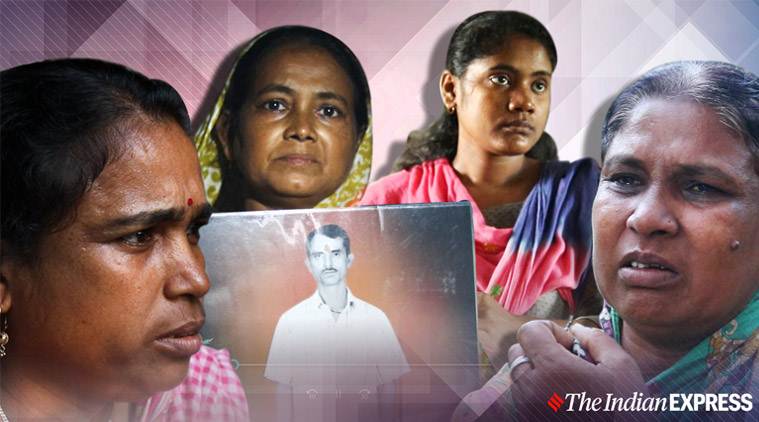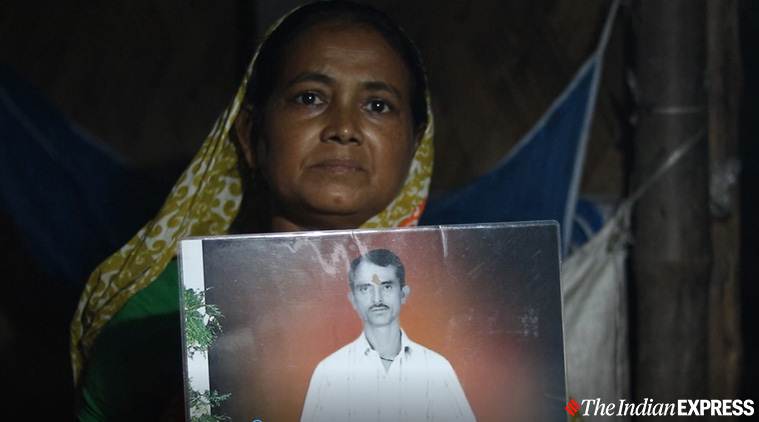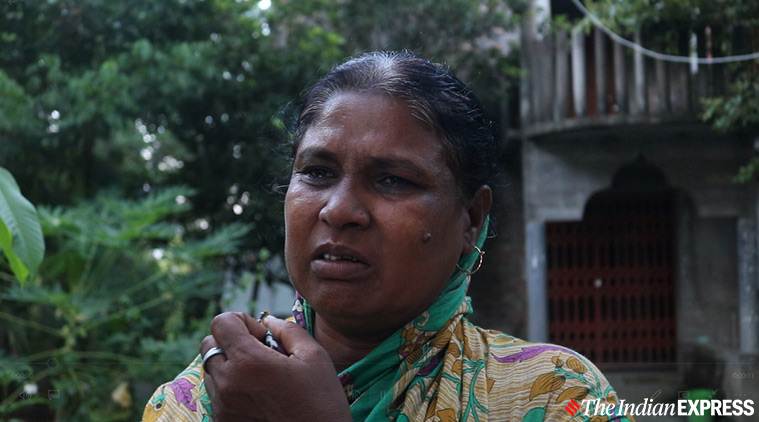Tiger widows of Sunderbans: In the shadow of mangroves, tale of courage and hope
by Premankur BiswasWritten by Premankur Biswas , Shashi Ghosh | Updated: February 14, 2020 7:48:46 pm

Women are trained to be tailors, amongst other things, at Joygopalpur Gram Vikash Kendra.
It was an unusually cold February morning when Shanti Das saw her husband for the last time. Days after Saraswati puja, the yearly invocation of the goddess of learning in most Bengali Hindu households, 50-year-old Gopal Das left his village, Joygopalpur, in a boat to hunt for crabs deep in the forests of Sunderbans. “I remember asking him to take an extra shawl. Generally, by February end, winter is on its way out. But that was not the case this year,” says Shanti (45).
Five days later, Shanti got a call from an unknown number. “It was the police. They called to say my husband had been mauled to death by a tiger that morning. Just like that, my world came crashing down,” says Shanti.
According to the West Bengal Forest Department, 20 people were injured and 24 killed by tigers in the last 18 years in South 24 Parganas, where the Sundarban Tiger Reserve is located. However, it’s important tonote that a number of such deaths are not reported because people killed are often hunting illegally in the forests. A report by National Centre for Coastal Research in 2018 points out that West Bengal lost maximum land due to coastal erosion in the country (99 sq km between 1990 and 2016). Between 1969 and 2009, about 210 sq km of landmass has eroded in the region. A report prepared by Jadavpur University and WWF has estimated that out of five million people living in the Sundarbans delta, one million will become climate change refugees by 2050. Which means, increasingly, human beings of the are encroaching on forest land. Making them vulnerable to such attacks.
“We have no other choice!”
We are in front of Shanti’s modest single-storeyed house. It looks like it has been painted recently. Shrubs of hibiscus dot the small patch of land in front of the house. A guava tree guards the entrance of the house. A half-built toilet stands a little away from the house.
Just a month before the incident, Shanti and Gopal had got their daughter married to a boy from a neighbouring village. The wedding feast was graced by “hundreds of guests”. Fish, meat and an assortment of sweetmeats were served at the feast. “We have a lot of debt. My son, who is in his early twenties, is working two shifts a day as a mechanic in Kolkata to pay off the debts,” says Shanti.

Pushpa Biswas holds up a picture of her husband, Sisir Biswas, who was a victim of a tiger attack. (Express Photo by Shashi Ghosh)
A five-minute walk down a slushy lane from Shanti’s house takes us to Pushpa Biswas’s thatched hut. Outside, dusk falls upon the Sunderbans like black,velvety curtain. Pushpa, 48, switches on the lone bulb in her one-room dwelling and holds up a picture of her husband, Sisir Biswas, who was mauled to death by a tiger about a year ago. “He tried but was a very poor farmer. He just didn’t know how to till the land. He was a woodcutter but now everything is machinised. He went to Kerala to be a contruction worker but came back withing months. There too he almost lost his life in an accident at the site. But death was following him. He went to collect honey from the forest and that’s when a tiger attacked him,” says Pushpa.
Standing up and confronting fears
At the sprawling vocational centre of the Joygopalpur Gram Vika Kendra, Sabitri Mondol, 40, is showing us the a “kimono” that volunteers from Denmark taught her to make. It’s more of a robe really, but the beaming confidence in Sabitri’s face stops us from correcting her. She lost her husband in a tiger attack a few years ago, the very mention of which still makes her “feel lost”. “It’s like every other story you will hear here. He went to collect crabs and didn’t come back. I did not even get to see his body,” says Sabitri.

Shanti’s husband was mauled by a tiger in February 2019. (Express Photo by Shashi Ghosh)
The West Bengal government claims that since 2009, 100,000 women are being trained to be independent through vocations such as embroidery, bee-keeping, tailoring, etc.
Biswajit Mahakur, secretary of Joygopalpur Gram Vikash Kendra, points out that financial independence is just the first step in the process of rehabilitation. “We have to realise that these people have no choice. These are some of the poorest areas of the state. Since most of farmers here grow only one crop a year, they are also jobless for a large chunk of the year,” says Mahakur.
With an income of INR 5000 per month, she is the only earning member of her family. “I am supporting my son and my parents. My son, who is a teenager now, is looking for a job in Kolkata. We have to take care of ourselves, we can’t depend on the government for help,” says Sabitri, who says she got no compensation from the government. “Since most of their husbands go for hunting illegally, they are scared to pursue for any kind of compensation,” says Mahakur.
Yet, there are many like Kirti Das, who lost three members of her family in a tiger attack, who feel that education and self-dependence is her only way out of this “hell”. “My father and my brother were mauled by tigers. A few years after my marriage, I lost my husband too. I couldn’t sit around and mope. I had to do something to make sure my young daughter at least is saved from this hell,” says Kirti. Today, seven years after losing her husband to a tiger attack, Kirti runs a tailoring shop from her house and trains other women in her village too. “When I started off, I used to make about ten bloouses a week. Now, I can easily make about 200 blouses. I can also make nighties and gowns. I want my daughter to complete her college education so that she can do something substantial in the city,” says Kirti.
Victims of climate and political crisis
When Amitava Chowdhury, a Kolkata-based doctor who has been volunteering in various dispensaries across the Sunderban area for the past two decades, is asked about the tiger attacks, he waves his hand off in dismissal. “Tigers are not the main enemy of the people here. Apathy is. There is not a single decent hospital in this area. There are no proper educational institutions here. In fact, there is only one higher secondary school in this whole area. How are these people expected to lead a better life here?” he asks.
Indeed, since this is one of the poorest regions of the state, and indeed the country, many women here are at risk of being trafficked.
In 2017, India’s National Crime Records Bureau in its annual report said there were 8,132 cases involving human trafficking in the country, with 3,579 recorded in Bengal alone. “If the government, both central and state, doesn’t do something about this apathy, the women of Sunderbans will continue to suffer,” says Chowdhury.
📣 The Indian Express is now on Telegram. Click here to join our channel (@indianexpress) and stay updated with the latest headlines
For all the latest India News, download Indian Express App.
© IE Online Media Services Pvt Ltd
0 Comment(s) *
* The moderation of comments is automated and not cleared manually by indianexpress.com.